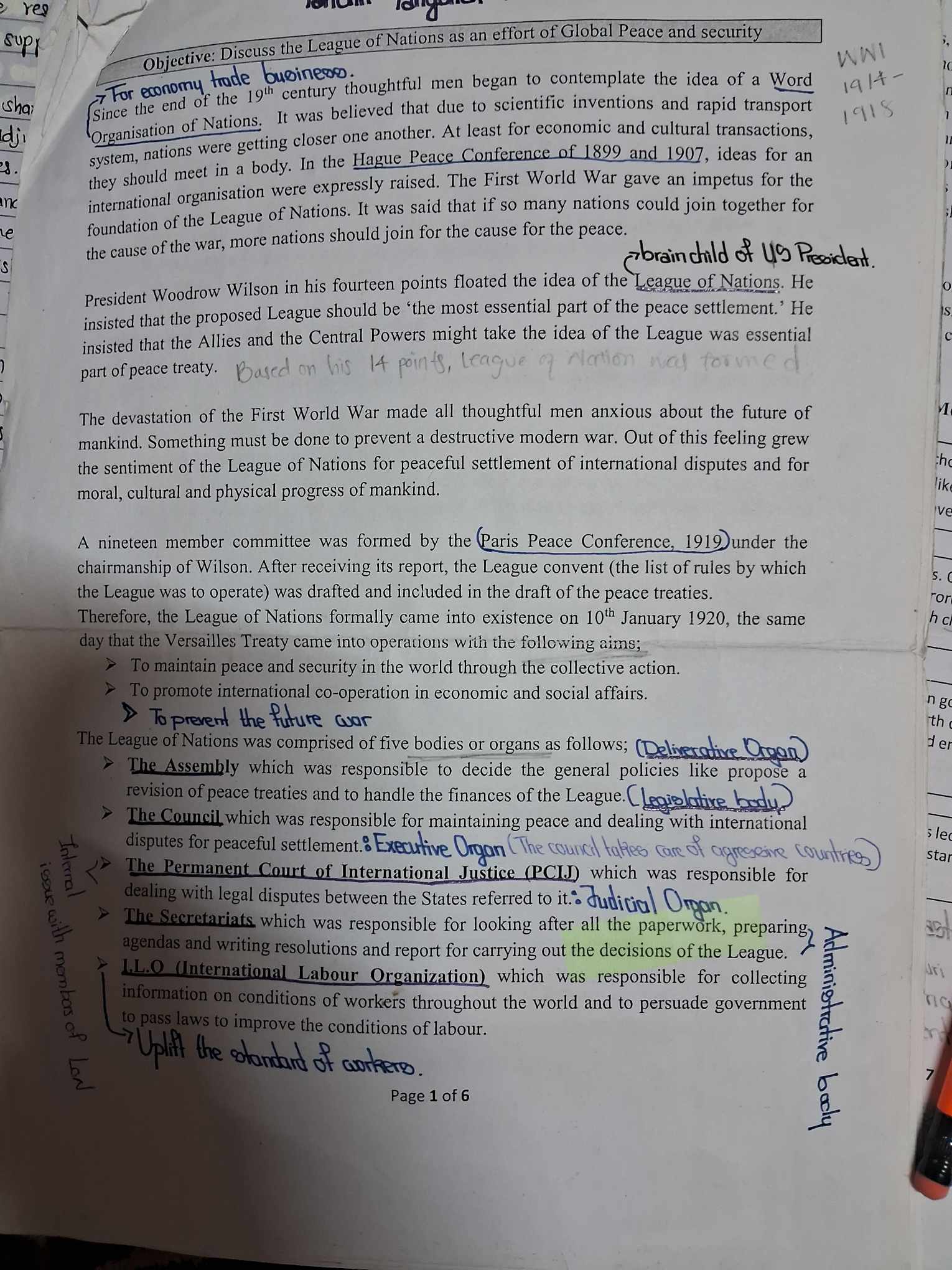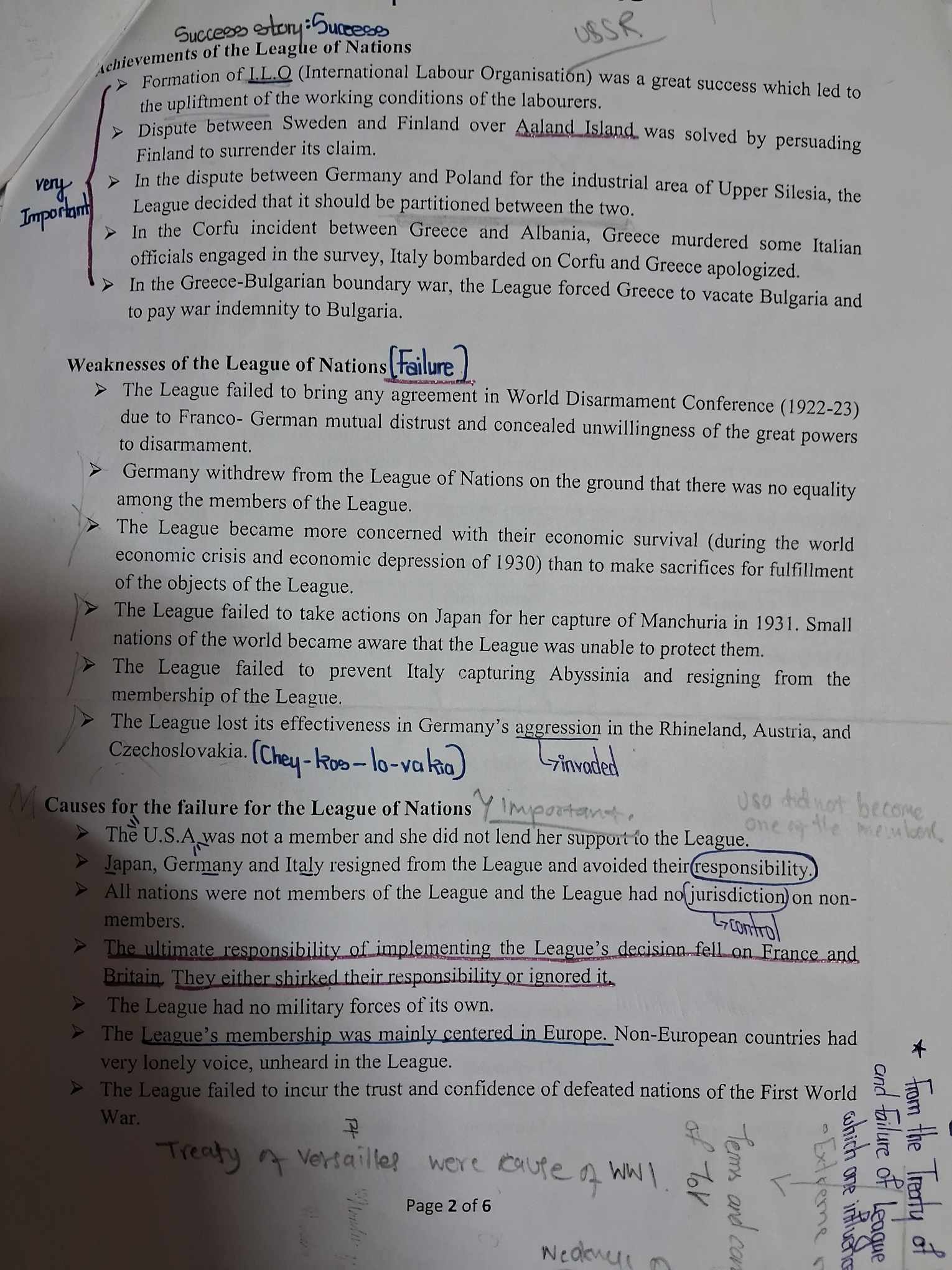Explain in simple words The League of Nations: A Prelude to Global Cooperation
The League of Nations: An Effort for Global Peace and Security

Objectives
- Discuss the League of Nations as an effort of Global Peace and Security.
Historical Context
- 19th Century Thought: Since the end of the 19th century, there was a growing belief that improved scientific inventions and transportation led nations to interact more closely.
- Hague Peace Conferences (1899 & 1907) : These conferences initiated discussions about the need for international organization, highlighting a desire for countries to collaborate for peace.
Key Events Leading to the League of Nations
- First World War: The war acted as a catalyst for the formation of the League of Nations. The perception that nations should unite for peace became more pronounced.
President Woodrow Wilson's Fourteen Points
- Foundation of the League: Wilson's points emphasized that the League should be integral to the peace settlement post-war. His insistence on collaboration indicated a shift towards more structured international relations.
- Peace Treaty Considerations: Wilson argued that both Allies and Central Powers needed to engage in the League for a comprehensive peace approach.
Formation of the League of Nations
- Paris Peace Conference (1919) : A committee was created aimed at forming the League, with Wilson as the chair.
- Versailles Treaty: This treaty brought the League into existence on January 10, 1920, with specific aims:
- To maintain peace and security globally.
- To promote international cooperation economically and socially.
Structure of the League of Nations
The League was composed of five key bodies:
| Body/Organ | Responsibility |
|---|---|
| The Assembly | Deciding general policies, proposing revisions of peace treaties, handling finances of the League. |
| The Council | Maintaining peace, dealing with international disputes for peaceful settlement. |
| Permanent Court of International Justice (PCIJ) | Addressing legal disputes between states, acting as a judicial organ. |
| The Secretariats | Handling paperwork, preparing agendas, and reporting on League decisions. |
| I.L.O (International Labour Organization) | Collecting information on worker conditions globally and advocating for better labor laws. |
Final Thoughts
- The League of Nations was a pioneering effort in international relations, showcasing nations' desire to collaborate for peace. Despite its eventual challenges, it laid the groundwork for future organizations, such as the United Nations, by emphasizing diplomacy and cooperative governance.
Reference:
history.state.gov
The League of Nations, 1920 - Office of the Historian
www.britannica.com
League of Nations | History, Definition & Purpose | Britannica
www.britannica.com
Members, Mandates, Covenant
Achievements and Failures of the League of Nations

Achievements of the League of Nations (Success)
-
Formation of I.L.O (International Labour Organisation)
- This marked a significant initiative aimed at improving labor conditions globally. Its focus on worker rights and conditions represented a major advancement in international relations and social justice.
-
Dispute Resolution between Sweden and Finland over Åland Island
- The peaceful resolution of this dispute through persuasion rather than conflict reflects the League's initial success in mediating international issues.
-
Partition of Upper Silesia
- This case shows the League's ability to resolve disputes between nations, contributing to stability in post-World War I Europe.
-
Corfu Incident
- The League successfully managed a diplomatic crisis by facilitating apologies and resolutions, demonstrating its potential when member nations cooperate.
-
Greece-Bulgarian War
- The League's intervention in this conflict illustrates its role in maintaining order and promoting dialogue between conflicting nations.
Weaknesses of the League of Nations (Failure)
-
Failure in World Disarmament Conference (1922-23)
- The inability to foster disarmament highlights the challenge of enforcing collective security and mutual trust among nations.
-
Involvement of Major Powers
- Germany's withdrawal from the League due to perceived inequalities signifies the discontent among major powers and hampers the League's authority.
-
Economic Concerns
- As the Great Depression impacted economies, the League became more focused on economic conditions rather than political stability, suggesting a shift away from its core mission.
-
Failure to Act on Japanese Aggression
- The League's inaction during Japan's invasion of Manchuria demonstrated its weaknesses and the inability to maintain peace and security, forcing nations to rely on their military power.
-
Failed to Prevent Italian Aggression
- The challenges in addressing Italy’s ambitions further illustrated the League’s limitations in enforcing rules among member states.
Causes for the Failure of the League of Nations
-
Absence of the U.S.A
- The non-participation of the U.S.A greatly reduced the League's effectiveness, as the U.S. was a major global power.
-
Resignations of Japan, Germany, and Italy
- These resignations underscored the League’s inability to maintain cohesion among powerful nations, leading to further instability.
-
Membership Issues
- The lack of global representation, especially from non-European countries, limited the League's authority and effectiveness in addressing international issues.
-
Responsibility on France and Britain
- The expectation that Britain and France would enforce the League's decisions revealed management issues and led to a shirking of responsibilities.
-
Lack of Military Force
- Without a military arm, the League could not enforce its decisions or deter potential aggressors effectively.
-
Focus on European Issues
- The League's predominance in European matters alienated non-European countries, resulting in a lack of trust and engagement from a significant portion of the world.
These notes summarize the primary points regarding the achievements and failures of the League of Nations, highlighting its historical context and the implications of its actions.
Reference:
www.ssag.sk
[PDF] League of Nations: Successes and Failures: Successes in the 1920s
www.johndclare.net
What were the successes and failures of the League of Nations in ...
courses.lumenlearning.com
The League of Nations | History of Western Civilization II